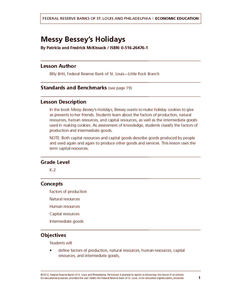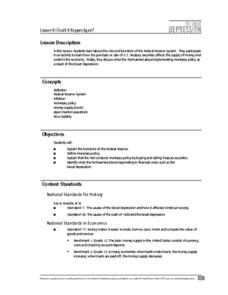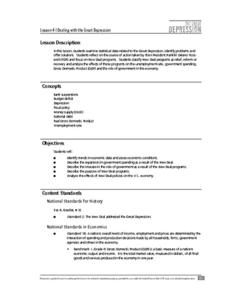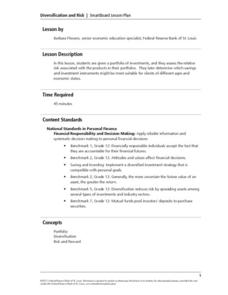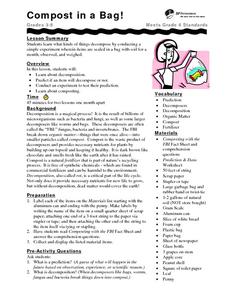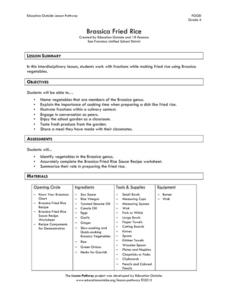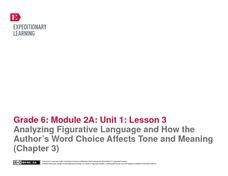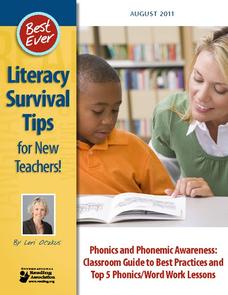Federal Reserve Bank
Messy Bessey's Holidays
Teach your class some fairly complex terms—factors of production, human resources, capital resources, natural resources, and intermediate goods—with a storybook (Messy Bessey's Holidays), plenty of visuals and handouts, and related...
Federal Reserve Bank
Ten Mile Day
Get your class working on the railroad with this detailed and interactive lesson. After reading and discussing Ten Mile Day, learners explore division of labor, human capital, and productivity with a hands-on group activity in which they...
Gateways
Teaching the Easter Story
If you are looking for a secular approach to teaching about Easter, this may just be the resource for you. Pupils read a paraphrased text depicting the last supper, arrest, and crucifixion of Jesus Christ as told in the Bible,...
Hyperion
Crispin: The Cross of Lead
Avi's Crispin: The Cross of Lead is the focus of a teacher's guide that provides background information on 14th Century England, a plot summary, discussion questions, activities, and resource links. A must-have for those who use this...
Federal Reserve Bank
Could It Happen Again?
The final instructional activity in a series of six about the Great Depression focuses on the Federal Reserve's role in stabilizing the economy.
Federal Reserve Bank
Turn Your Radio On
After listening to and analyzing a series of FDR's Fireside Chats, groups create their own recordings, and using New Deal programs, address a current economic condition.
Federal Reserve Bank
Dealing with the Great Depression
As part of their study of the Great Depression, young economists examine statistical data to determine the effectiveness of FDR's New Deal recovery programs.
Federal Reserve Bank
Diversification and Risk
After being given a portfolio of investments, your young economists will learn how to assess the relative risk of the portfolio's products and understand the importance of diversification, relating these economic concepts to real-life...
Education Outside
Compost in a Bag
Young scientists create a compost bag, predict changes, and after one month, examine the bag to observe the changes that have occurred.
Education Outside
Brassica Fried Rice
Here's a delicious way to engage fourth graders into working with fractions. Kids chop brassica or cruciferous vegetables, measure the required ingredients, and add them to cooked rice to produce a delicious treat.
EngageNY
End of Unit 1 Assessment: Analyzing an Excerpt from Barack Obama’s Back-to-School Speech
In order to assess their mastery of the concepts taught in a 12-lesson plan unit study of Christopher Paul Curtis' Bud, Not Buddy, individuals read excerpts from President Barack Obama's 2009 Back-to-School Speech and use the strategies...
EngageNY
Getting the Gist and Determining Word Meaning: Paragraphs 12–14 of Steve Jobs’ Commencement Address (and connecting to Chapter 8)
Groups use a Venn diagram to compare the theme of love and loss in Steve Jobs' 2005 commencement address to Stanford University students and Christopher Paul Curtis' Bud, Not Buddy.
EngageNY
Mid-Unit 1 Assessment: Figurative Language and Word Choice in Bud, Not Buddy (Chapter 5)
Individuals utilize the strategies practiced in the previous lesson to complete a mid-unit assessment on figurative language and how Christopher Paul Curtis uses word choice to create meaning in Bud, Not Buddy.
EngageNY
Analyzing Figurative Language and How the Author’s Word Choice Affects Tone and Meaning (Chapter 3)
How figurative language affects the tone and meaning in Chapter Three of Christopher Paul Curtis' Bud, Not Buddy is the focus of a series of exercises that ask readers to locate, record, and analyze Curtis' word choices.
EngageNY
Figurative Language and Word Choice: A Closer Look at Bud, Not Buddy (Chapter 2)
The difference between an average and an unforgettable writing can lie in the author's word choice. The figurative language in Chapter 2 of Christopher Paul Curtis's Newbery Medal Winner, Bud, Not Buddy, is the focus of a series of...
International Reading Association
Literacy Survival Tips for New Teachers!
Whether new to teaching or a seasoned pro, this 12-page phonics and phonemic awareness guide is a must for your curriculum library. Everything from a summary of research on the topic to exercises and activities is included.
Kentucky Educational Television
What Is Honesty?
This is an absolute must-have resource for exploring honesty with your learners! Youngsters role play four scenarios that involve honest and dishonest actions, and then engage in meaningful discussion and activities regarding those...
STEM for Teachers
Tsunami!
How does the depth of an ocean affect the speed of a tsunami's waves? Use Jell-o, graham crackers, and marshmallows to model the effects of an underwater earthquake and its resulting tsunami. The lesson includes hands-on activities,...
Foreign Policy Association
U.S. and Europe Online Lesson Plan
Class groups investigate the economic and political implications of a country's policies on genetically modified foods, craft a position paper detailing that policy, and share their findings with the class. Armed with this...
Growing Classroom
Space Travelers
Groups of three scientists from the rocky planet Zog investigate the composition of soil so that they can take the information back to their home, create soil there, and begin to grow food.
Crafting Freedom
Harriet Jabocs and Elizabeth Keckly: The Material and Emotional Realities of Childhood in Slavery
Through the journals written by Harriet Jacobs and Elizabeth Keckly, young readers gain insight into the lives of two enslaved children on nineteenth-century plantations.
Project Noah
Writing Goes Wild
Young scientists develop their observation and writing skills as they craft and then post a detailed description of a plant or animal they have spotted and photographed.
August House
The Clever Monkey Rides Again
How very clever. No need to monkey around with this resource. Rob Cleveland's version of the West African tale, "The Clever Monkey Rides Again," is used as the basis for multiple of cross-curricular activities including exercises...
Curated OER
Beowulf: Lesson Plan and Supplementary Materials
A reading of Beowulf: Dragon Slayer, Rosemary Sutcliff's retelling of the classic epic poem, launches an exploration of what it means to be a hero, a noble leader, and a great warrior. A great way to introduce middle schoolers to...


